Top 13 Online Learning Platforms to Watch in 2026

It’s an open secret that the eLearning industry has been growing rapidly in recent years. There has been a significant increase in online learning platforms, particularly following the COVID-19 pandemic.
The same is reflected in the statistics as well. As per Custom Market Insights, the eLearning market is projecting $764 billion by 2034 with a CAGR of 8.5%
Therefore, we’ve put together a list of the Top eLearning platforms for you. But before hopping onto the platforms, let’s quickly understand what they are.
What Is an eLearning Platform?
eLearning platforms could be defined as a space that fosters learning through digital resources such as online learning materials or tools that are hosted on eLearning marketplaces.
Some Examples include-
- Udemy
- Coursera
We’ll discuss them in detail in the upcoming sections.
Now, we have identified how online learning platforms work, so let’s also understand how we can benefit from them-
Why eLearning Platforms Matter: Key Benefits for Learners and Businesses
Although online course platforms come up with numerous pros, we have highlighted some of the key ones for you. These are as follows-
24/7 Access
The foremost value these online eLearning platforms offer is that they are 24/7 available. It can be accessed just through a mobile device with an internet connection.
Self Paced
With them, you can learn at your own pace without having to worry about missing out on anything. It could be rewound and learned again at any point in time.
Time Saving
With digital learning platforms, you can learn new skills from the comfort of your home, eliminating travel time and increasing productivity.
Affordability
These platforms come up with varied pricing options such as one-time fees, subscription-based pricing, etc. It provides you the liberty to choose a plan according to your budget.
Universal Access
You can learn from the teachers of globally renowned institutions and industry pioneers without any additional expenses.
So far, we’ve underlined the meaning and importance of the eLearning platforms. Now, let’s move to the Top 13 Online Learning Platforms in 2026.
Top 13 Online Learning Platforms to Watch in 2026
There’s a sea of options available for one to choose from. But we have handpicked the top 13 platforms for online courses after a thoughtful evaluation of their key features, pros & cons, and pricing. Here’s a quick look.-
1. Thinkific

First on the list is Thinkific. It is an online e-learning platform that fosters the creation and monetization of digital learning products like ebooks or online learning courses, and equips you with marketing tools for them as well.
Key Features
- White-label mobile app
- Blended learning support
- AI-powered course landing pages
Pros
- Ease of use, intriguing interface
- Excellent customer support
- Quizzes and Surveys
Cons
- Interactivity is missing
- Extensive content becomes cumbersome
- Certificate customization is limited
Pricing
Free trial. Paid plans start at $36/month
2. Duolingo
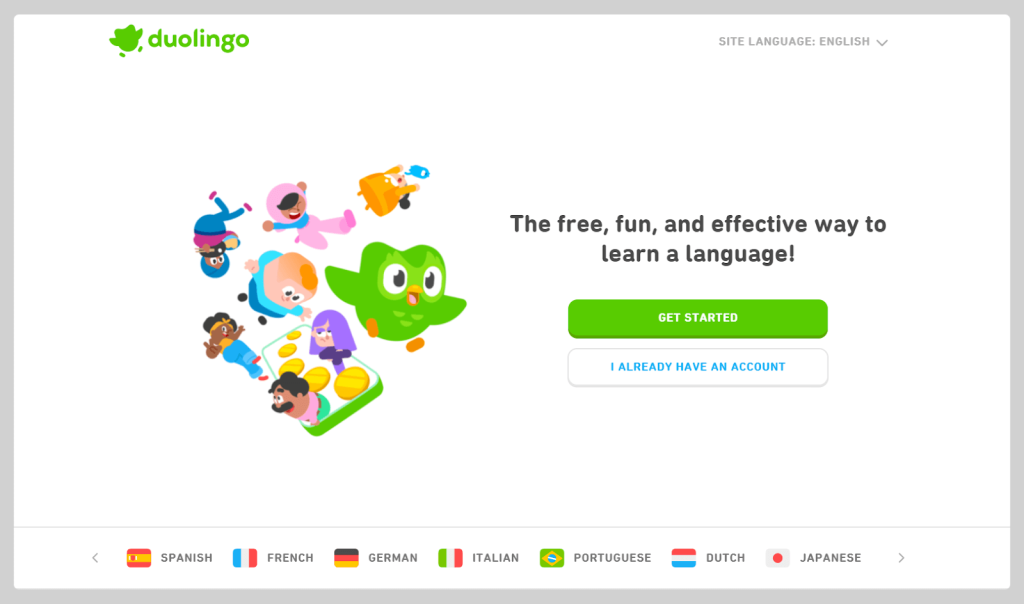
A leading language e-learning platform, it houses 40+ language courses, including Spanish and French. It facilitates learning through gamified modules, avoiding monotony, and works for beginners as well as advanced learners.
Key Features
- Bite-sized modules
- Mobile-friendlyness
- Research-oriented curriculum
Pros
- Highly convenient and flexible
- Diverse languages
- Real-world engagements
Cons
- Overemphasis on gamification
- Lacks depth in advanced learning
- Frequent upgradation
Pricing
It is free.
3. Coursera
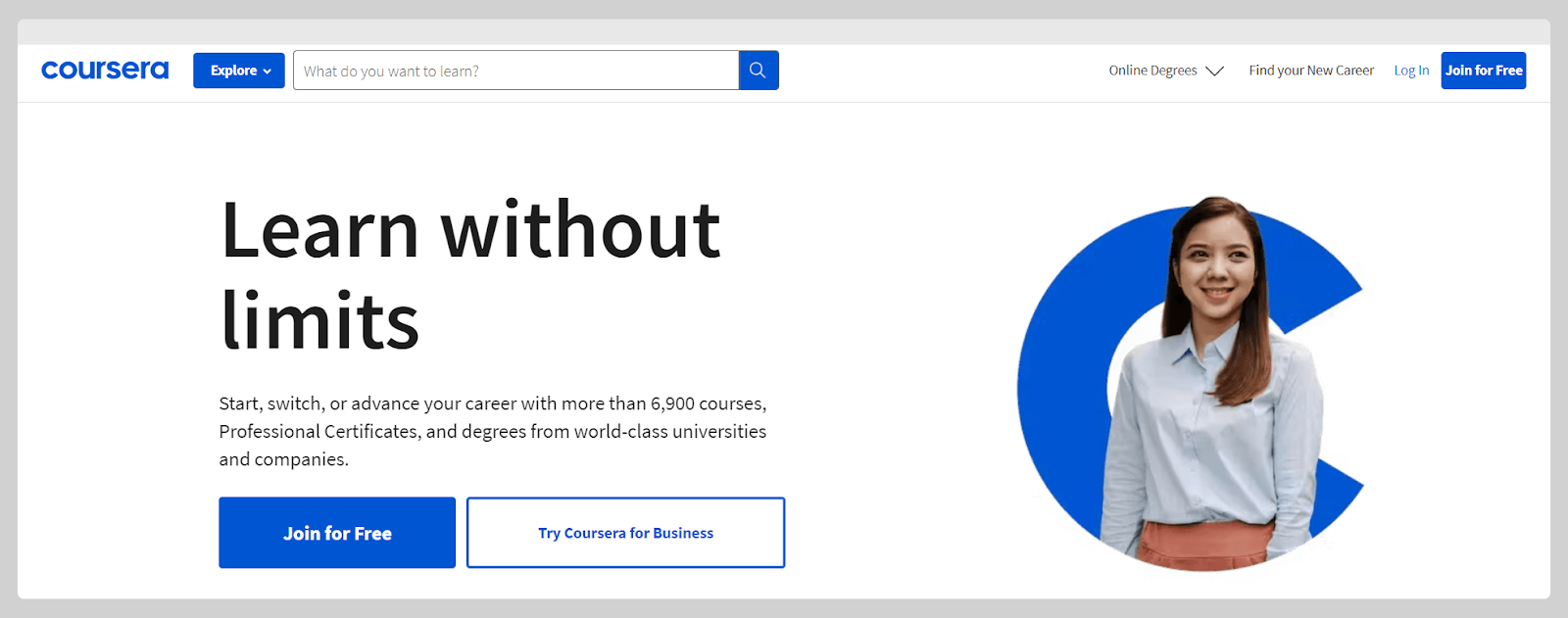
It offers online learning courses in collaboration with top-tier universities worldwide like Stanford and Yale. It’s wide range of courses includes certifications, specializations to full-fledged degree courses recognized by employers.
Key Features
- Courses from top universities
- Offline Access
- On-demand learning with mobile apps
Pros
- Diverse courses and specializations
- High-quality content
- Corporate training with Coursera Business
Cons
- Some courses are expensive
- Overemphasis on academic content
Pricing
Courses start at $39 with certifications and go up to $2,000 for university programs.
4. Khan Academy
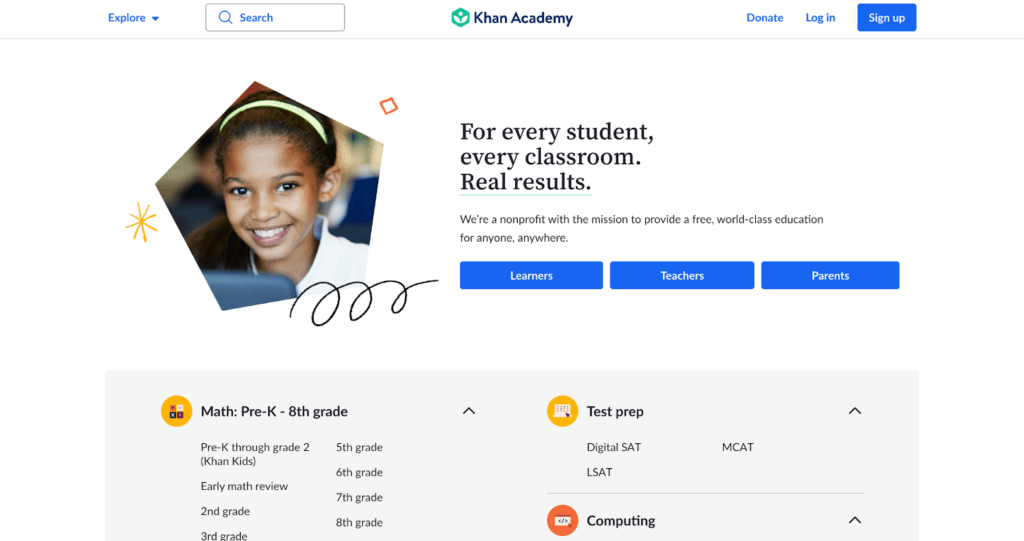
Khan Academy offers free resources and courses primarily for the K-12 curriculum. Known for its widespread adaptive learning technology, it is a non-profit institution
Key Features
- Interactive learning with quizzes and exercises
- Personalized experience
- Extensive course content
Pros
- Free Access
- High-quality content
- Global Reach
Cons
- Limited Professional Courses
- Not Accredited
- Dependency on the internet
Pricing
It is absolutely free!
5. Udemy
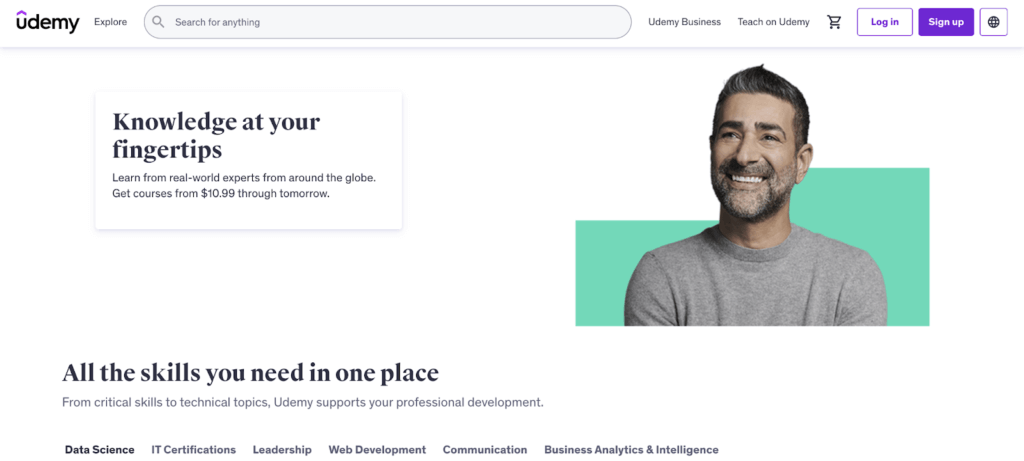
One of the top platforms for online courses is Udemy. It covers a varied range of courses from personal development to professional skills. It offers pay-per-course pricing, making it highly affordable and reliable.
Key Features
- Wide range of courses
- Covers both technical and non-technical aspects
- Self-paced learning
Pros
- Low-cost learning
- Constant upgrades
- Lifetime Access
Cons
- Lacks gamification
- Knowledge gaps
- No academic credit
Pricing
Varies between $9.99 -$199.99, depending on the courses
6. LinkedIn Learning
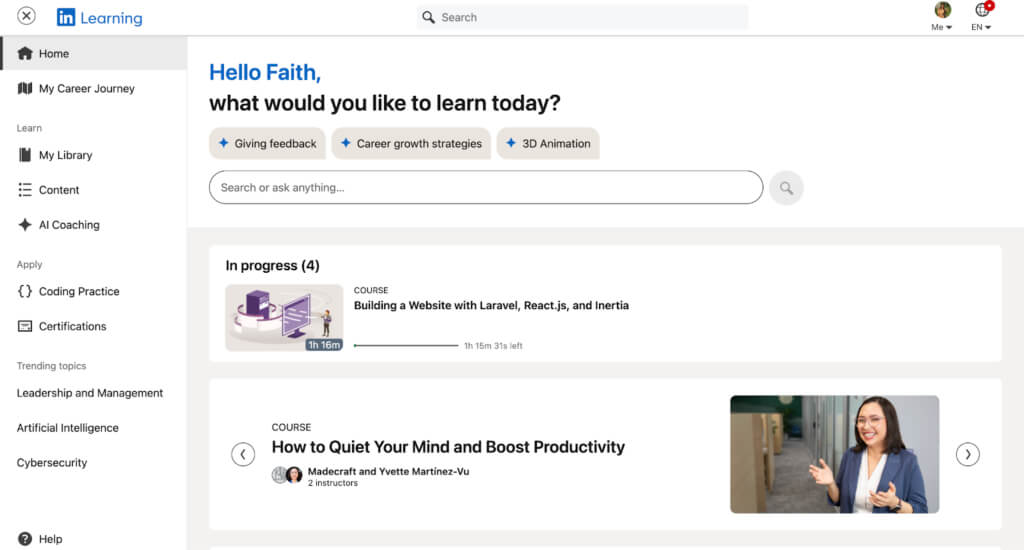
It is an e-learning platform for professionals by LinkedIn. The courses on the platform focus on the professional growth of individuals, like leadership, marketing, etc
Key Features
- Courses by industry experts
- Integration with LinkedIn Network
- Quizzes and other interactive practices
Pros
- Certification courses
- Vast content offerings
- Personalized recommendations
Cons
- Subscription is mandatory for complete access
- No lifetime access
- Accreditation missing
Pricing
Courses begin from $20-50, while the subscription starts from $39.99 per month and $239.88 for a year.
7. Treehouse
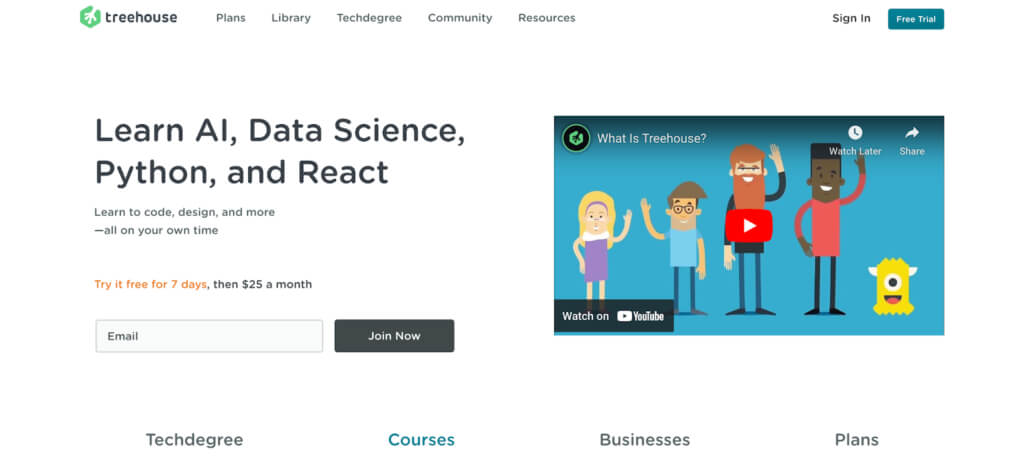
It is an online e-learning platform specifically for coding and programming skills. It prioritizes imparting well-rounded knowledge about cybersecurity, frontend development, and web development. etc
Key Features
- Courses are divided into tracks for simplified learning
- Community-driven learning
- Career- prone content
Pros
- Imparts practical skills
- Real-time projects
- Engaging learning through videos and quizzes
Cons
- Only focused on tech and coding
- Limited course offerings
- Subscription-based access
Pricing
Charges $25 per month and $250 annually
8. EdX

Offers courses from universities and global institutions like MIT and Harvard across various domains like engineering, business studies, and humanities, etc.
Key Features
- Digital certifications
- Admin analytics dashboard
- Industry partnerships
Pros
- Accredited courses
- Auditing feature
- High-quality content
Cons
- Navigation issues
- Audit access is limited
- Lackluster learner support
Pricing
Free classes are available. Certificates start at $50.
9. Skillshare
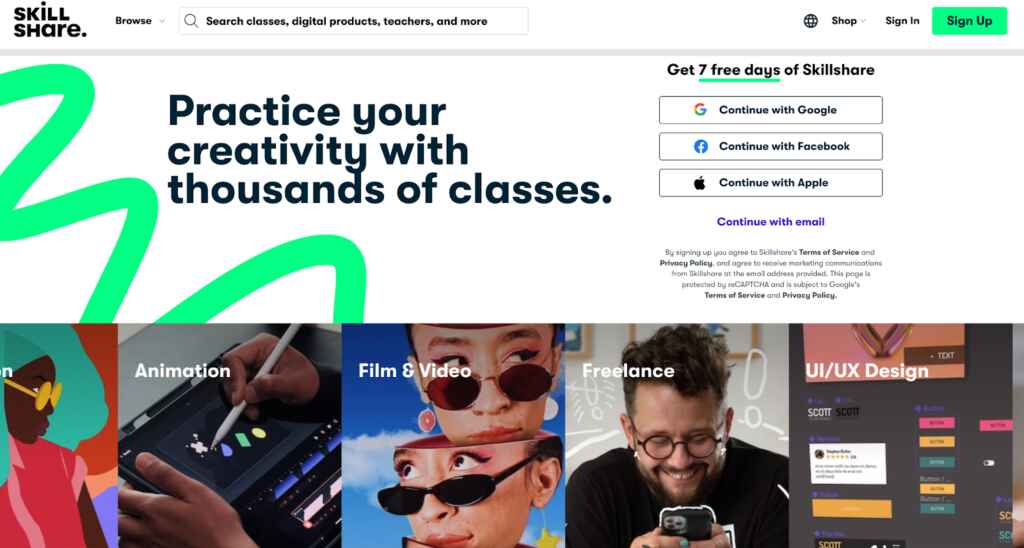
It stands out as a creative online learning platform, specializing in creative courses such as design, photography, writing, etc. It offers diversified courses at an affordable price.
Key Features
- Bite-sized modules
- On-demand learning
- Learning from domain experts
Pros
- 35,000+ courses
- Free trials
- Affordable pricing
Cons
- Refund and cancellation issues
- Shallow course content
- Subscription-dependent access
Pricing
Starts from $14 per month and $168 a year.
10. MasterClass

One of the best online learning platforms, featuring top professionals like Gordon Ramsay and Martin Scorsese. It personifies perfection in the field of arts, business, and lifestyle.
Key Features
- Celebrity-led courses
- Facilitates course streamlining
- Package-sized modules
Pros
- Engaging teaching methods
- Insights from industry leaders
- Engagement through storytelling
Cons
- Less focused on practical skills
- Less interactive
- Shallow content depth
Pricing
$10/month (billed annually)
11. Teachable
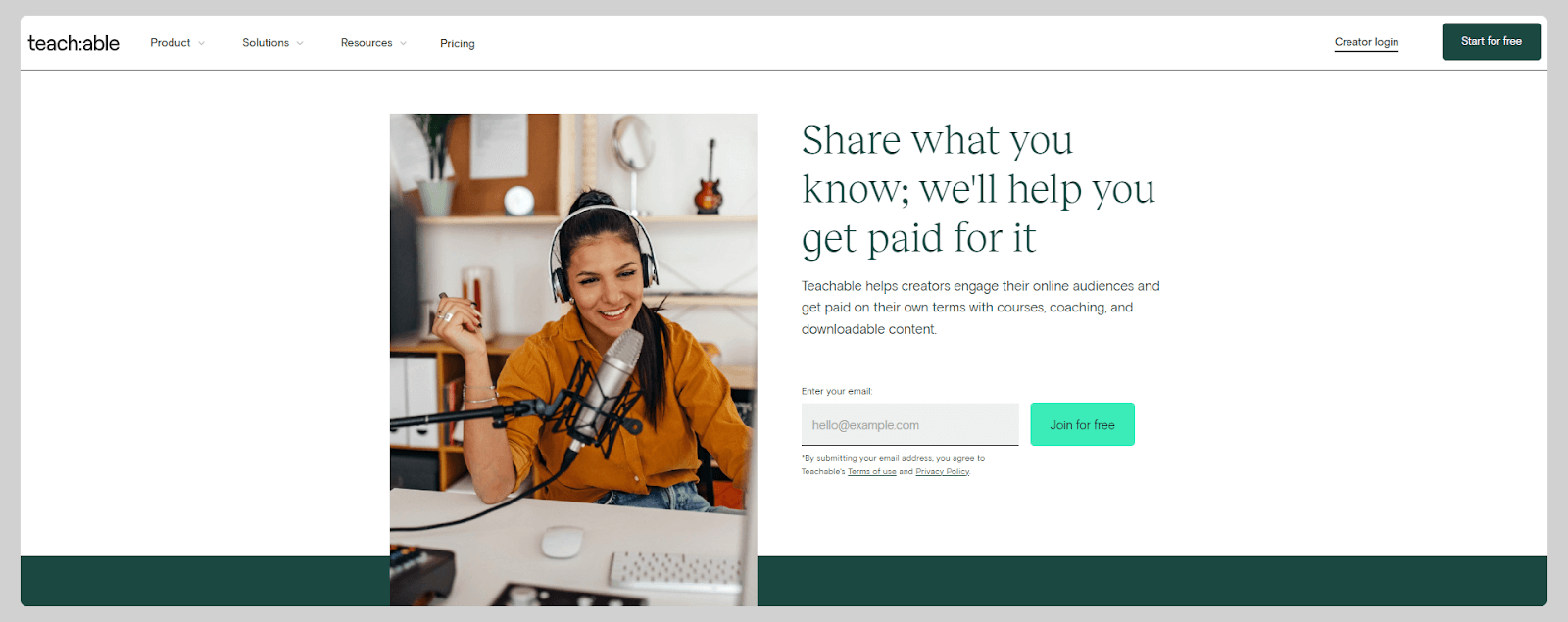
Teachable offers a user-friendly environment for creating and selling online courses. The platform is implanted with robust features and is highly effective and flexible in terms of monetization.
Key Features
- Reliable and scalable
- Consumer support and integrations
- Equipped with reporting and editing features
Pros
- Marketing tools are available
- Ease of use
- Beginner-friendly platform
Cons
- Consumer support hazards
- Limited design flexibility
- Costly upgrades
Pricing
Starts from $29-$39 per month and goes up to $399 as per requirement.
12. Open Learning
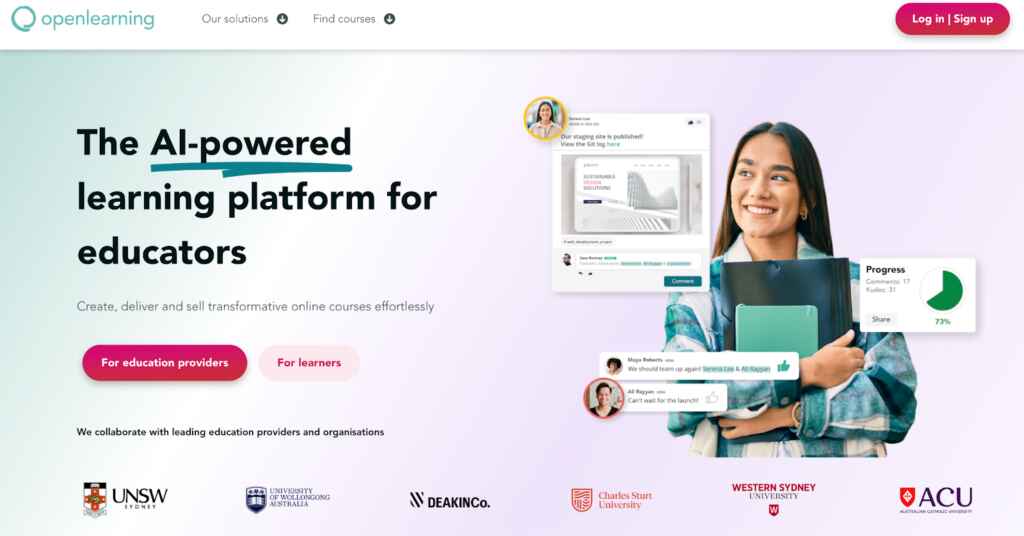
OpenLearning is a leading online learning platform largely due to its social learning approach and emphasis on student engagement through discussions and group activities.
Key Features
- Active learning
- Social media style course feed
- AI-driven tools
Pros
- Certifications and micro credentials
- Deep engagement
- 30-day free trial
Cons
- Limited third-party interactions
- Smaller course catalog
- Customisation limits
Pricing
While it offers a 30-day free trial and free courses are also available, microservice courses are at $150-$500.
13. FutureLearn
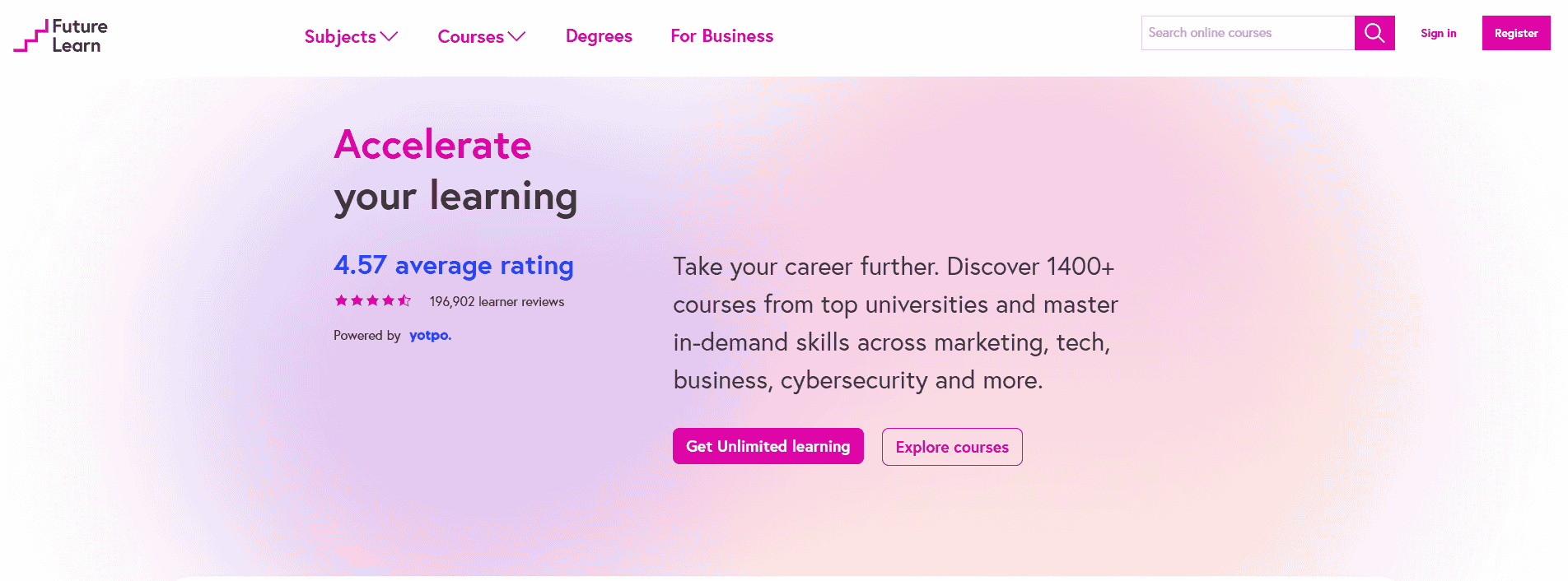
FutureLearn offers online courses and degrees in collaboration with premier institutes, with a diverse and engaging content catalog focusing on interactive learning.
Key Features
- Free auditing feature
- Cohort model
- Positive reviews
Pros
- Accredited, high-quality content
- Self-paced learning
- Social learning approach
Cons
- No mobile app
- Smaller course catalog
- Support limitations
Pricing
Courses are free for a limited time (without a certificate). Paid plans start at $39 per course or $39.99/month, with premium options up to $400.
How to Choose the Best eLearning Platform for Your Needs
Choosing the best online learning platform matters as it is the first step of a learner’s journey, and the future will largely depend on this decision.
There are certain factors to look for while choosing the ‘best online learning site, these are as follows-
Course Structure
Courses are available on YouTube as well, but the irony is it is not properly structured. So always look for the structure of the courses listed on the platform. Is it easy to navigate and understand? If that’s not the case, the platform is not for you.
Reviews and Ratings
You should also pay attention to the reviews and ratings of the platform. It gives you an idea about the overall learning experience as well as about the platform.
Personalised Experience
The digital learning platform must offer personalized learning experiences such as content in vernacular languages, real-time progress tracking, etc, leveraging AI.
Interactive Learning Opportunities
It must present the course content in the form of quizzes, gamified modules, or Q&As to make learning interactive and engaging.
Pricing
Another important aspect is pricing. Free courses are also available, but might lack quality. You may consider the skills and the value they may add and decide whether it’s worth the money.
These offer varied pricing options like subscriptions or a monthly fee, lifetime unlimited access, free trials, etc. So you can choose what suits you best.
Conclusion
With the world going digital with each passing day, online learning platforms are undoubtedly the future of learning. Because it’s making education accessible to everyone, irrespective of diverse cultures and geographies.
Platforms such as Udemy, Khan Academy, etc, are revolutionizing the eLearning space by offering quality education at affordable prices and preparing students for today’s dynamic job market.







 Branded Solutions
Branded Solutions






















